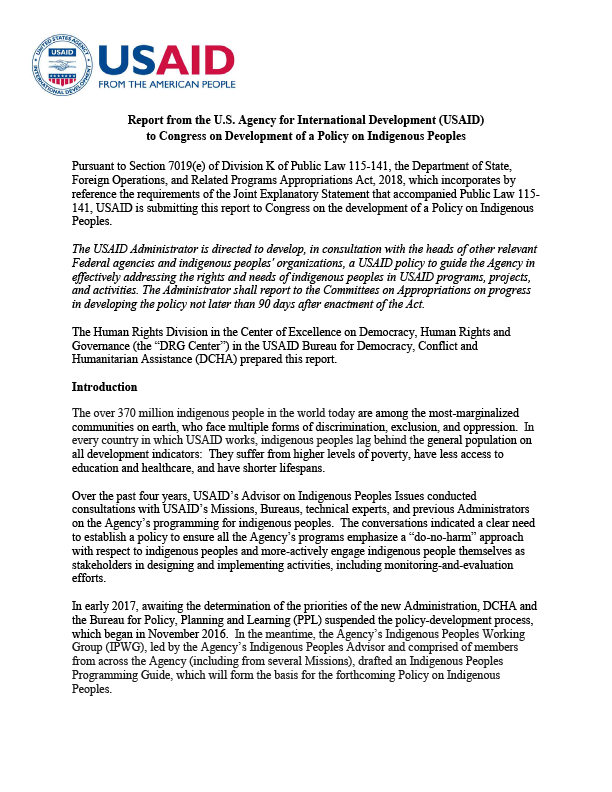Speeches Shim
Pursuant to Section 7019(e) of Division K of Public Law 115-141, the Department of State, Foreign Operations, and Related Programs Appropriations Act, 2018, which incorporates by reference the requirements of the Joint Explanatory Statement that accompanied Public Law 115-141, USAID is submitting this report to Congress on the development of a Policy on Indigenous Peoples.
The USAID Administrator is directed to develop, in consultation with the heads of other relevant Federal agencies and indigenous peoples' organizations, a USAID policy to guide the Agency in effectively addressing the rights and needs of indigenous peoples in USAID programs, projects, and activities. The Administrator shall report to the Committees on Appropriations on progress in developing the policy not later than 90 days after enactment of the Act.
The Human Rights Division in the Center of Excellence on Democracy, Human Rights and Governance (the “DRG Center”) in the USAID Bureau for Democracy, Conflict and Humanitarian Assistance (DCHA) prepared this report.
Introduction
The over 370 million indigenous people in the world today are among the most-marginalized communities on earth, who face multiple forms of discrimination, exclusion, and oppression. In every country in which USAID works, indigenous peoples lag behind the general population on all development indicators: They suffer from higher levels of poverty, have less access to education and healthcare, and have shorter lifespans.
Over the past four years, USAID’s Advisor on Indigenous Peoples Issues conducted consultations with USAID’s Missions, Bureaus, technical experts, and previous Administrators on the Agency’s programming for indigenous peoples. The conversations indicated a clear need to establish a policy to ensure all the Agency’s programs emphasize a “do-no-harm” approach with respect to indigenous peoples and more-actively engage indigenous people themselves as stakeholders in designing and implementing activities, including monitoring-and-evaluation efforts.
In early 2017, awaiting the determination of the priorities of the new Administration, DCHA and the Bureau for Policy, Planning and Learning (PPL) suspended the policy-development process, which began in November 2016. In the meantime, the Agency’s Indigenous Peoples Working Group (IPWG), led by the Agency’s Indigenous Peoples Advisor and comprised of members from across the Agency (including from several Missions), drafted an Indigenous Peoples Programming Guide, which will form the basis for the forthcoming Policy on Indigenous Peoples.


Comment
Make a general inquiry or suggest an improvement.